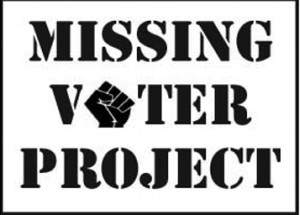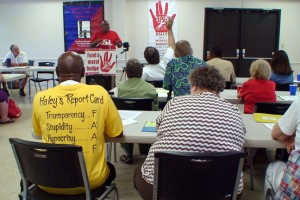Imagine how different South Carolina would be today if another 15% of registered black voters had bothered to vote in 2010.
If they had, South Carolina probably wouldn’t be suing the federal government to require voters to have photo IDs, or to allow police to require strangers to show their papers. We might have a Health Exchange that lowered the cost of health insurance. We would be embracing the expansion of Medicaid to 344,000 poor South Carolinians – with the state paying only 5% of the cost – as a terrific deal.
“We’re not losing elections,” said SC Progressive Network Co-chair Virginia Sanders, “we’re forfeiting them.” Sanders is referring to the fact that it would have only taken 15% of the registered black citizens who sat out the 2010 election to have changed the results. Nikki Haley won the race by 59,971 votes. There were 387,559 registered, and 168,734 unregistered, blacks who didn’t vote in 2010.
“We have the names and addresses of these missing voters,” Sanders said, “and we need help to knock on their doors. We can provide lists of infrequent and unregistered black voters in any precinct in the state.” Sanders is the Midlands coordinator of the Missing Voter Project, a nonpartisan voter registration/education effort that has registered and educated SC voters since 2004.
“We don’t tell people who to vote for,” said Network Midlands coordinator Bishop Shirley Raiford,” and we don’t just organize around elections. We educate people about the issues and policies that affect their lives and urge them to get involved in an ongoing movement for social justice. If a few more black citizens realized that we have the power to improve the quality of life in this state we might not have the nation’s poorest funded mental health services, lowest Temporary Aid to Needy Families and the country’s shortest unemployment coverage.”
The MVP data base targets voter engagement efforts down to individual addresses. “We don’t have to set up a table at the shopping center and wait for a missing voter to walk by, we know where they live,” Sanders said. “We need your help talk to all of them.”
Citizens, schools, churches and organizations who want to participate in the nonpartisan Missing Voter Project should contact the Progressive Network at 803-808-3384, or by email at network@scpronet.com.




